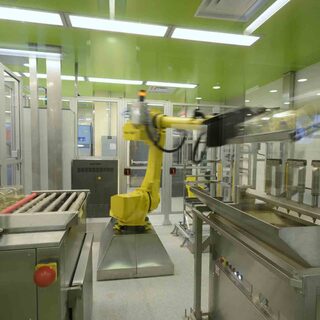Tradeline's industry reports are a must-read resource for those involved in facilities planning and management. Reports include management case studies, current and in-depth project profiles, and editorials on the latest facilities management issues.
Latest Reports
Regents Hall Science Center
Regents Hall Science Center, the first phase of Georgetown University’s Science Facilities Master Plan, integrates all physics, chemistry, and biology research labs on three connected floors. The new facility also houses the Institute for Soft Matter Synthesis and Metrology, funded in part through a $6.9 million grant from the National Institutes of Standards and Technology. The institute conducts research into materials that are neither liquids nor solids, such as liquid crystals, gels, colloids, polymers, and foams.
Proposed ANSI Standard on BSL-3 Ventilation Systems Open for Review
The American National Standards Institute (ANSI) will be collecting comments through Sept. 10 on its new standard, Testing and Performance-Verification Methodologies for Ventilation Systems for Biosafety Level 3 (BSL-3) and Animal Biosafety Level 3 (ABSL-3) Facilities, also known as ANSI Standard Z9.14-2013. The 127-page document provides guidance for the inspection and testing of ventilation system components of new or existing BSL-3 and ABSL-3 laboratories, including research, pharmaceutical, and insectary facilities.
Clara Christie Centre for Mouse Genomics
The 33,000-sf Clara Christie Centre for Mouse Genomics (CCCMG) at the University of Calgary—a centralized facility for the production and breeding of transgenic mice—expands mouse housing, provides procedure spaces for researchers, enables mouse transgenics production, and creates new space to phenotype the transgenic models.
Best Practices for Successful Revalidation of BSL-3 Labs
Annual revalidation of BSL-3 biocontainment facilities—which involves verifying that systems are operating to specifications—is important not only to maintain a safe working environment for scientific needs, but also to reduce utility and maintenance costs and protect the substantial financial investments such buildings represent. The time and expense of the revalidation process can be minimized with careful preplanning.
Sandler Neurosciences Building
The five-story, 237,000-sf Sandler Neurosciences Center creates a new hub for the Mission Bay campus of the University of California, San Francisco, with the consolidation of the Department of Neurology, the Neurodegenerative Disease Research program, the Center for Integrative Neurosciences, and the Institute for Neurodegenerative Diseases. The 38-year lease, after which UCSF will own the building, represents the first time the University of California System has used a public-private-partnership funding model for a solely programmatic facility.




